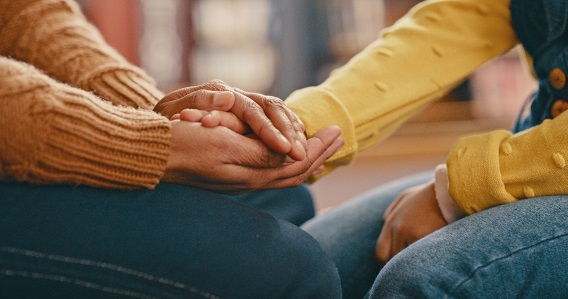4 Signs Mesothelioma Was Impacting My Mental Health
Health & WellnessWritten by Tamron Little | Edited By Amy Edel

If you’ve read any of my previous blogs or heard me speak, you’ve probably heard me say: “I didn’t know I needed therapy until I was in therapy.” It’s the truth, and to be honest, I wasn’t aware of the effects that life changes, especially a mesothelioma diagnosis, can have on your mental health.
Please note that I’m not a licensed mental health professional. This is my personal account of my own mental health experience after being diagnosed with a rare cancer and the changes I noticed within myself. I recommend you speak with your physician and/or a mental health professional.
I’ve found that mental health is just as important as our physical health. From experience, I learned that it affects how we think, feel and behave. It plays a crucial role in our ability to cope with life’s challenges.
I think that sometimes we tend to overlook signs our mental health is being affected. At least in my own case, this was so. Ignoring or being unaware of our mental health needs can lead to serious consequences if we don’t address it.
4 Warning Signs My Mental Health Was Being Affected
Some signs can be a red flag that your mental health is being affected. Some of the signs and symptoms I experienced were from the opposite ends of the spectrum, as well. I hope this list helps others experiencing the challenges of coping with a mesothelioma diagnosis.
- Changes in sleeping patterns
- Loss of interest
- Physical symptoms
- Social withdrawal
After receiving a mesothelioma diagnosis, it’s vital for us as patients to make sure we’re getting the physical and mental health help we need. Recognizing the signs that your mental health is affected is crucial in maintaining your overall well-being.
Changes in Sleeping Patterns
I experienced both sleeping too much and being unable to stay asleep. When I slept, I slept and slept. I thought I was just tired and needed rest.
When I couldn’t sleep, my mind was racing a mile per minute. I just thought I had a lot going on.
The fact was I was experiencing depression and didn’t know it. I had mistakenly assumed being depressed meant you were down in the dumps and just had sad thoughts and feelings of despair.
Please don’t ignore any changes in your sleep patterns. They can significantly impact your overall well-being and be a sign of another issue.
Loss of Interest
If you notice a loss of interest in activities you once enjoyed, it could be a sign that your mental health has been affected. I noticed subtle changes in myself.
For example, I found myself not wanting to talk on the phone. If you know me, you know that I’m a talker!
After my peritoneal mesothelioma diagnosis, I would answer the phone if family members or close friends called, but would find myself saying, “I just don’t feel like talking.” Or I just didn’t feel like texting someone back.
That wasn’t me.
Sometimes I felt sadness and a general lack of motivation to engage with others or participate in activities that I once found enjoyable. I noticed these things and didn’t know they were alerting me that something was up.
Physical Symptoms
Mental health symptoms don’t always present themselves right away. It was about a decade after my diagnosis and mesothelioma treatment that I was aware of the physical symptoms that indicated my mental health needed some attention.
Physical Signs I Experienced
- Concentration and focus challenges
- Consistent headaches
- Fatigue
- Memory issues
- Mental exhaustion
The physical symptoms that prompted me to get help stemmed from when I started having panic attacks. It was like something would trigger my mind to go into fight or flight mode.
My Panic Attack Symptoms
- Excessive sweating
- Heart palpitations
- Itching
- Shortness of breath
- Upset stomach
At the time, I thought it was really something physical, so I was referred to various specialists to get to the bottom of it all. It turned out it was anxiety, depression, PTSD and grief, all indicators that my mental health needed some attention.
It amazes me even to this day how our mental health can affect all aspects of our body and show up in physical and mental forms. It truly demonstrated to me that our mental health is just as important as our physical health.
Social Withdrawal
I’m a social butterfly and have always been one. I’m that person who mingles in the crowd and introduces myself to total strangers.
There were times during the earlier period of my diagnosis when I didn’t want to go out and socialize or be among people. But I noticed that I would make excuses for why I couldn’t go anywhere beyond those reasons.
I was lying to myself about why I didn’t want to go out. I was withdrawing because my mental health needed attention.
Available Resources for Mental Health Help for Mesothelioma Survivors
Maybe you haven’t given this topic any thought or been made aware of this until now. But If you find yourself experiencing these signs, it’s imperative that you seek help. There are a number of resources available.
Mental Health Resources
- Mental Health Webinar: For mental health tips, check out the recording of a recent webinar I participated in with fellow mesothelioma survivors, a mental health counselor and a registered nurse.
- Online Support Group: Find support and community in the online support group from The Mesothelioma Center with expert facilitators.
- Patient Advocates: Get to know and connect with a team of Patient Advocates dedicated to helping mesothelioma survivors throughout their mesothelioma journeys.
- Private Facebook Group: Join fellow mesothelioma survivors and caregivers in a private, exclusive group on Facebook, designed and moderated for the mesothelioma community.
I’m glad that I began to recognize the signs. Understanding that these signs were telling me I needed to address not only my physical health, but also my mental health helped me get on the path I needed to find a therapist who has helped me.
Raising awareness about mesothelioma also means raising awareness about mental health. I hope that sharing my own personal story helps you feel comfortable exploring some of the diverse resources for mesothelioma survivors and their families.






